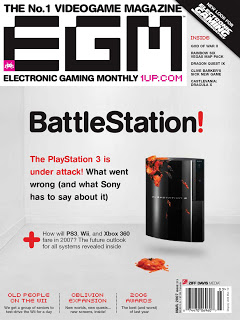Public-relations agents count among the most under-appreciated people in the video-game industry. The job requires one to balance the expectations of consumers, developers, publishers, and journalists — all at the same time. When those very different interests align, it's a beautiful thing. Sometimes, however, a client's talent for self-sabotage changes the landscape in an instant. Every game console experiences a slip-up or two, but Sony's frequent missteps must present quite a challenge for the PR unfortunates left to deal with the mess.

So, in honor of those unthanked people and their thankless jobs, let’s reflect on all the PR nightmares the PlayStation 3 has graced us with. So far.
Launch price point (July 2005)
When discussing the day-one price point of the PS3, then-President of Sony Computer Entertainment Ken Kutaragi wanted nothing more than for "consumers to think to themselves, 'I will work more hours to buy one.' We want people to feel that they want it, irrespective of anything else." For those people already working two jobs, you could donate blood or hit up the local sperm bank.
Cell processor: To the future! (December 2006)
Sony intended "to use the Cell processor across a variety of home applications," but their expensive investment in Cell technology never realized its full potential. And how useful would a Cell processor be in my toaster, anyway?

Manufacturing on a decline (September 2006)
During a press conference, Kutaragi commented that, “If we’re asked whether Sony’s quality of manufacturing has declined, I would have to say yes," according to a Wall Street Journal report. I'm sure his manufacturing counterparts would have appreciated a little forewarning before getting thrown under that bus.
It's a computer! (June 2006)
At one point, we all thought Sony wanted to sell us a computer that also played games. According to Kutaragi, “We put up no restrictions. Because it is a computer, it can interact with anything, freely. If someone is familiar with PC building, he or she can upgrade easily PS3’s hard drive.” In reality, Sony only suffered for the PS3's almost PC-like vulnerability to hacking. When Kaz Hirai replaced Kutaragi six months later, he firmly declared the PS3 "a game machine. It’s nothing more than that.”
What shortage? (March 2007) 
Artificial hype can be a monster that refuses to die. Sony Computer Entertainment of America CEO Jack Tretton found this out the hard way when Dan "Shoe" Hsu and Shane Bettenhausen quoted him in the March 2007 issue of Electronic Gaming Monthly on the touchy subject of PS3 sales. As Tretton put it, "If you can find a PS3 anywhere in North America that's been on shelves for more than five minutes, I will give you 1200 bucks for it." Penny Arcade found 11 in one day. They weren't the only journalists who went on a successful PS3 scavenger hunt, either.
This Is Living (March 2007)
If you can make it to the end of this ad campaign, you'll find a PlayStation 3 logo. Other than that, I have no idea what the hell this is. As far as I'm aware, nobody living or dead does, either.
[embed:http://www.youtube.com/watch?v=psd8oVToS8k ]
It only doesn't do Linux (March 2010)
After three years of quiet and prosperity, Sony reneged on the whole "it's a computer" thing when Sony Senior Director of Corporate Communications Patrick Seybold announced the next system firmware update would disable the “install other OS” feature. This inspired numerous lawsuits…and numerous hackers, all of whom set their sights on cracking the PlayStation Network.
Bad Tweet, KB (February 2011)
The Kevin Butler personality proved very successful for Sony and the PlayStation brand, but everyone makes mistakes. Whoever manages the @kevinbutler account on Twitter made a big one during a conversation when "KB" accidentally retweeted a PS3 Security key along with the immortal phrase "lemme guess…you sank my Battleship?” More like you shot yourself in the foot, KB.

The Great PlayStation Network Outage (April-May 2011)
The PlayStation Network went on the blink the evening of April 20 and went down altogether a day later. Despite sporadic updates, it took Sony a full week to acknowledge that customer information had been compromised. The breach also affected some Sony Online Entertainment subscribers and all PSN/Qriocity members, too. Oops.
What, me worry about you? (May 2011)
How did Sony Corporation CEO Sir Howard Stringer explain that delay? Boldly, of course. "Most of these breaches go unreported by companies. Forty-three percent notify victims within a month. We reported in a week. You're telling me my week wasn't fast enough?" Actually, yes, I am. Sorry if I hold you to a higher standard than those other companies.
VentureBeat's mission is to be a digital town square for technical decision-makers to gain knowledge about transformative enterprise technology and transact. Learn More
